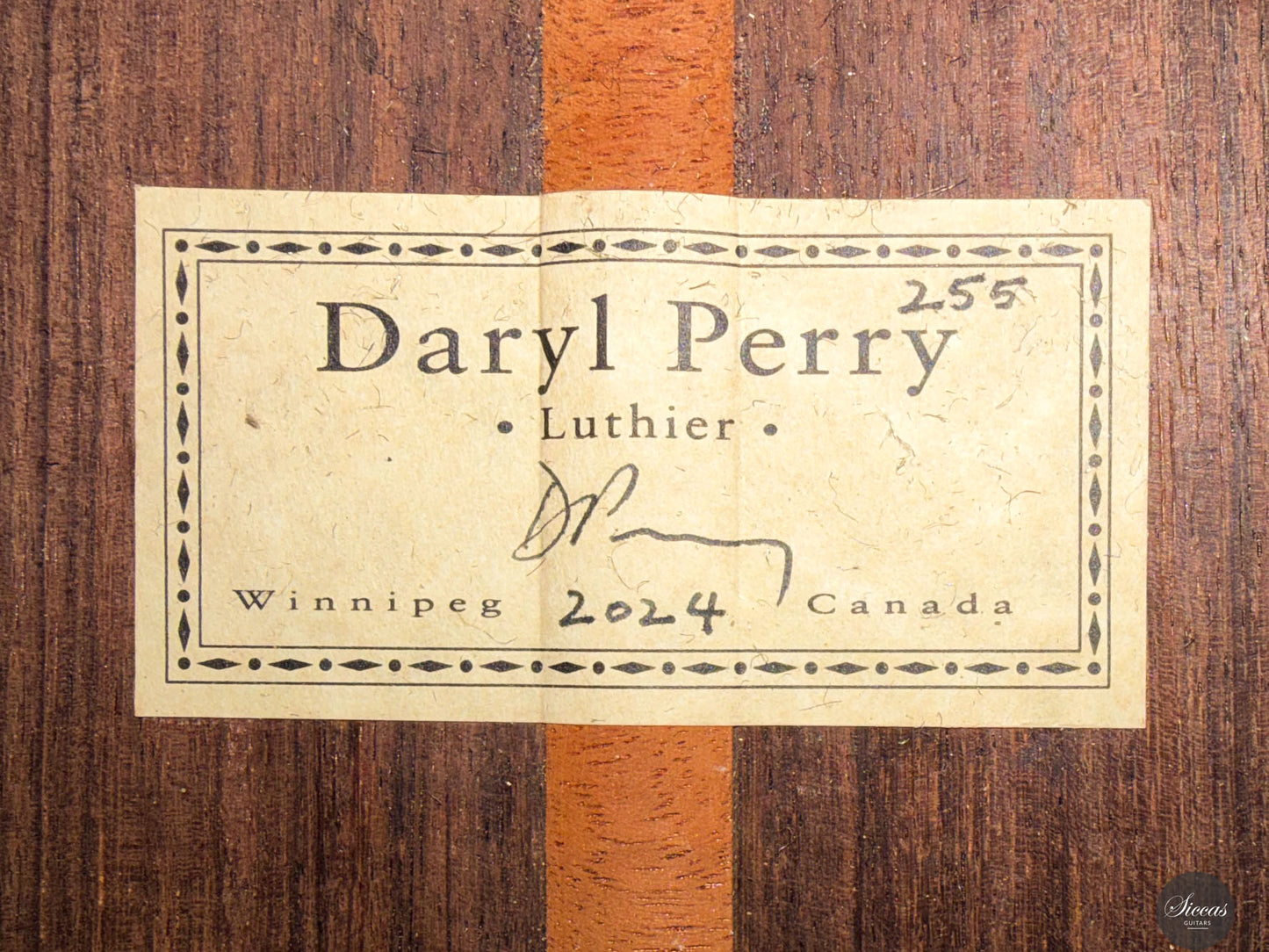Daryl Perry - 2024 No. 255
Daryl Perry - 2024 No. 255
Details
Details
Overview
Overview
Shipping important note
Shipping important note
Important: Additional costs such as import taxes and custom duties may occur when importing goods from the EU into your country.
Delivery times are typically reliable and most instruments arrive within the estimated timeframe.
Should any unexpected delay occur, our team will keep you informed and provide support at every step. For all shipping details and exceptions, please see our Shipping Policy.
Details about GPSR
Details about GPSR
























Video overview


More details about the guitar
About the luthier
Daryl Perry has been building classical guitars in his Winnipeg workshop since the early nineteen eighties and is regarded as one of the most respected luthiers in Canada. His work is shaped by an attentive study of nineteenth and twentieth century masters and by an insistence on using traditional hand tools. This approach allows him to respond directly to the individual qualities of each piece of wood. The instruments he creates are known for their tonal purity their structural refinement and an understated elegance that focuses attention on the music itself. His guitars are played by internationally known artists including Marcin Dylla and are valued for their balance clarity and expressive sensitivity.
Perry’s work combines tradition with meticulous precision. Each instrument reflects a deep musical intuition and a commitment to creating guitars that are dependable on stage and inspiring in the hands of the performer. His guitars have become highly sought after for their beauty of tone and the natural transparency with which they handle complex textures.
About the guitar
This instrument from 2024 bearing the number 255 is a traditionally built concert guitar that clearly expresses Daryl Perry’s artistic vision. The spruce soundboard is finished with French polish and paired with Indian rosewood which provides warmth colour and a natural singing quality. The design reveals a clear sense of proportion and an elegant restraint that recalls historical instruments while maintaining a distinct contemporary refinement. Rodgers tuning machines complete the instrument with smooth and reliable tuning.
The sound is characterised by clarity and a gentle richness. The registers are shaped with care. The basses are present and supportive while the trebles carry a focused and crystalline voice. The guitar offers excellent separation of lines which allows polyphonic passages to unfold with precision. The sustain is long and even yet it never obscures articulation so the tone remains controlled even at broader dynamics. The overall balance is exemplary and the instrument projects its voice with ease while preserving a lyrical and highly expressive quality.
Condition
The guitar is in excellent condition with no cracks or repairs and retains its original finish. It shows only minimal signs of careful use.
Regular care extends the life of the instrument
Even with careful use, a classical guitar may gradually change in appearance or respond to unstable storage conditions. Have a close look at your guitar regularly and be attentif to changes. If your instrument is suffering from its environement, it will let you know.
Protect Your Guitar: Handle with Care
Be mindful when touching your instrument with greasy or unwashed hands: any skin contact is a small attack on the varnish. Of course, a guitar is made to be played, but taking a few precautions helps preserve its beauty: wash your hands before playing, wear long sleeves, and avoid unnecessary direct skin contact with the body of the instrument.
Pro tip: Avoid playing with a button-up shirt, heavy jewelry, or a belt, as these can scratch the guitar. Also, make sure your guitar case is free of any objects that could damage the instrument during storage.
String care
A good habit to adopt is wiping down your strings briefly after each playing session. This small action significantly extends their lifespan and helps maintain a consistent, comfortable feel under your fingers.
Most importantly, clean strings are essential for keeping your instrument in tune. Corrosion, sweat, and dust can affect the uniformity of the strings and interfere with accurate tuning across the entire fingerboard.
Pro tip: If you're having trouble getting your guitar in tune, it might be time to change the strings. A useful test is to compare the pitch of the 12th fret harmonic with the fretted note at the 12th fret; if there's an unusually large gap between them, your strings may have lost their integrity and should be replaced.
Keep Your Shellac Finish Shining!
Got a guitar with a shellac (French polish) finish? Here's a simple trick: Take a clean microfiber cloth and gently breathe on the surface to create a light mist. Then, softly rub to remove fingerprints, sweat, and grease. That’s usually all it takes to keep it looking great, no products needed!
Pro tip: Every few years, treat your guitar to a check-up with a luthier to keep it in top shape.
Storing Your Guitar: Climate Matters
Your guitar can safely stay outside its case, as long as the surrounding environment maintains 42–55% humidity and a temperature between 18–25°C.
Keep in mind that humidity levels can still fluctuate inside the case, especially during seasonal changes.
- Too much humidity may cause overtightened strings and a dull tone.
- Too little humidity can lead to a bulging top, string buzz, or even cracks.
Avoid placing your guitar near radiators, air conditioners, or windows with direct sunlight.
Pro tip: Always close your guitar case while playing. This helps preserve a stable microclimate inside the case, so your instrument is protected the moment you put it back in.



















































